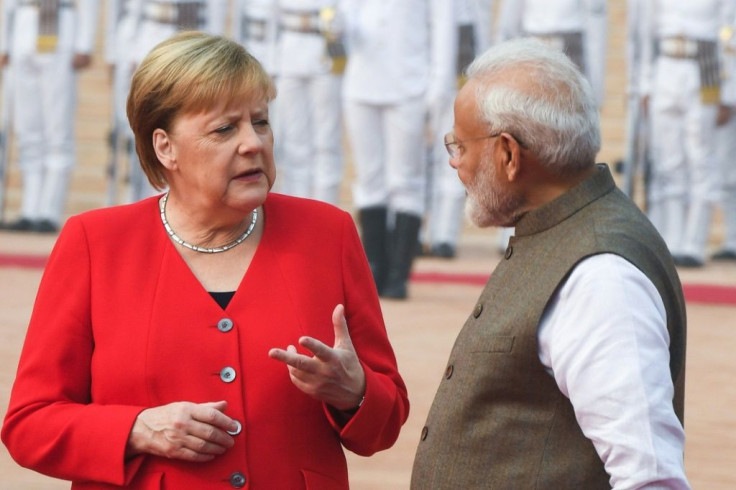European Union, India Meet At Virtual Summit To Discuss Trade, Security, Covid-19 Pandemic

KEY POINTS
- India’s bilateral trade with the EU in 2018-19 amounted to $115.6 billion
- Trade negotiations between the two parties have stalled since May 2013
- IMF said India’s gross domestic product will drop by 4.5% this year
India and the European Union are holding a virtual trade summit on Wednesday through video conference that will focus primarily on fighting the covid-19 pandemic and various trade issues between the economic giants.
The EU is represented by European Council President Charles Michel and European Commission chief Ursula von der Leyen, while the Indian delegation is led by Prime Minister Narendra Modi.
Modi initially planned to visit Brussels in March for a summit, but his trip was canceled by the coronavirus outbreak.
India's Foreign Ministry Spokesperson Anurag Srivastava said the summit is "expected to discuss developments around the COVID-19 pandemic and contemporary global matters of interest to both sides.”
The EU is India's biggest trading partner.
India’s bilateral trade with the EU in 2018-19 amounted to $115.6 billion with exports valued at $57.17 billion and imports at $58.42 billion.
India is the EU's tenth largest trading partner.
However, trade negotiations between the two parties have stalled since May 2013 largely due to conflicts over important topics like tariff cuts and intellectual property rights.
But India and Europe have also both been hammered by the pandemic, causing lockdowns that have severely cut economic growth prospects.
Last week, the European Commission, the executive branch of the EU, said it projected the euro zone’s economy will shrink by 8.7% -- with France, Italy and Spain suffering the worst declines of more than 10%.
The International Monetary Fund estimated that India’s gross domestic product will drop by 4.5% this year.
While some nations around the world are adopting more protectionist attitudes, India and the EU may seek to restart talks on a stalled free trade deal, called the EU-India Broad-based Trade and Investment Agreement.
The EU wants India to cut import duties on various products, including wines, automobiles and dairy products. Brussels also wants New Delhi to establish a strong intellectual property regime. In turn, India wants to be granted data secure nation status by the EU.
At the beginning of the summit Modi said relations between Europe and India were vital to global peace.
“I am fully committed to [the] strengthening of ties between India and EU,” he said. “We should go for action-oriented agenda to expand ties and it can be implemented within [a] stipulated time frame. We both are also focused on long-term challenges such as climate change.”
Von der Leyen said the EU seeks an "ambitious" free trade deal with India, but cautioned "we're not there yet.”
"But, with this high-level trade and investment dialogue, we hope to advance things and to promote our common interest in moving forward towards a free trade agreement," von der Leyen added.
However, some analysts are skeptical that the summit will produce much of substance.
"I don't expect any headline-grabbing announcements [from the summit],” said Shashank, a former Indian foreign secretary. "As far as the much-talked [about free trade agreement] with the EU is concerned, the only FTA that we would like to pursue right now is the one with the Americans. I don't know whether we would like to open our markets [to] the Europeans right now.”
Sreeram Chaulia, professor and dean at the Jindal School of International Affairs in Delhi, is similarly skeptical.
"The FTA has been frozen for years and right now, given an economic depression-like scenario, most countries are expected to turn very protectionist and impose more and more tariff barriers," Chaulia said. "So I don't see a liberalized kind of forward movement happening."
Aside from trade issues, India and EU have upgraded their security and defense ties – and the summit may also touch on these key issues.
"As far as the non-economic stuff goes, that is more interesting," said Chaulia. "The Europeans are trying to come up with a new China policy and we would want them to think of India as a partner in a global setting. Even though they [EU] know about India's latest confrontation with China and the fact that Indian troops were killed, I didn't hear much from [European Union Minister for Foreign Affairs] Josep Borrell or any of the EU bigwigs like [German Chancellor] Angela Merkel."
Chaulia added: "But they [EU] do care about human rights and on those counts they do see China negatively in terms of what is happening in Xinjiang, Hong Kong or Tibet."
© Copyright IBTimes 2025. All rights reserved.





















